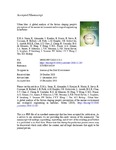Urban blue: A global analysis of the factors shaping people's perceptions of the marine environment and ecological engineering in harbours.
| dc.contributor.author | Strain, EMA | |
| dc.contributor.author | Alexander, KA | |
| dc.contributor.author | Kienker, S | |
| dc.contributor.author | Morris, R | |
| dc.contributor.author | Jarvis, R | |
| dc.contributor.author | Coleman, R | |
| dc.contributor.author | Bollard, B | |
| dc.contributor.author | Firth, Louise | |
| dc.contributor.author | Knights, Antony | |
| dc.contributor.author | Grabowski, JH | |
| dc.contributor.author | Airoldi, L | |
| dc.contributor.author | Chan, BKK | |
| dc.contributor.author | Chee, SY | |
| dc.contributor.author | Cheng, Z | |
| dc.contributor.author | Coutinho, R | |
| dc.contributor.author | de Menezes, RG | |
| dc.contributor.author | Ding, M | |
| dc.contributor.author | Dong, Y | |
| dc.contributor.author | Fraser, CML | |
| dc.contributor.author | Gómez, AG | |
| dc.contributor.author | Juanes, JA | |
| dc.contributor.author | Mancuso, P | |
| dc.contributor.author | Messano, LVR | |
| dc.contributor.author | Naval-Xavier, LPD | |
| dc.contributor.author | Scyphers, S | |
| dc.contributor.author | Steinberg, P | |
| dc.contributor.author | Swearer, S | |
| dc.contributor.author | Valdor, PF | |
| dc.contributor.author | Wong, JXY | |
| dc.contributor.author | Yee, J | |
| dc.contributor.author | Bishop, MJ | |
| dc.date.accessioned | 2019-01-29T08:52:26Z | |
| dc.date.available | 2019-01-29T08:52:26Z | |
| dc.date.issued | 2019-03-25 | |
| dc.identifier.issn | 0048-9697 | |
| dc.identifier.issn | 1879-1026 | |
| dc.identifier.uri | http://hdl.handle.net/10026.1/13232 | |
| dc.description.abstract |
Marine harbours are the focus of a diverse range of activities and subject to multiple anthropogenically induced pressures. Support for environmental management options aimed at improving degraded harbours depends on understanding the factors which influence people's perceptions of harbour environments. We used an online survey, across 12 harbours, to assess sources of variation people's perceptions of harbour health and ecological engineering. We tested the hypotheses: 1) people living near impacted harbours would consider their environment to be more unhealthy and degraded, be more concerned about the environment and supportive of and willing to pay for ecological engineering relative to those living by less impacted harbours, and 2) people with greater connectedness to the harbour would be more concerned about and have greater perceived knowledge of the environment, and be more supportive of, knowledgeable about and willing to pay for ecological engineering, than those with less connectedness. Across twelve locations, the levels of degradation and modification by artificial structures were lower and the concern and knowledge about the environment and ecological engineering were greater in the six Australasian and American than the six European and Asian harbours surveyed. We found that people's perception of harbours as healthy or degraded, but not their concern for the environment, reflected the degree to which harbours were impacted. There was a positive relationship between the percentage of shoreline modified and the extent of support for and people's willingness to pay indirect costs for ecological engineering. At the individual level, measures of connectedness to the harbour environment were good predictors of concern for and perceived knowledge about the environment but not support for and perceived knowledge about ecological engineering. To make informed decisions, it is important that people are empowered with sufficient knowledge of the environmental issues facing their harbour and ecological engineering options. | |
| dc.format.extent | 1293-1305 | |
| dc.format.medium | Print-Electronic | |
| dc.language | en | |
| dc.language.iso | en | |
| dc.publisher | Elsevier | |
| dc.subject | Coastal armouring | |
| dc.subject | Eco-engineering | |
| dc.subject | Estuaries and bays | |
| dc.subject | Human perceptions | |
| dc.subject | Stakeholders | |
| dc.subject | Urbanisation | |
| dc.title | Urban blue: A global analysis of the factors shaping people's perceptions of the marine environment and ecological engineering in harbours. | |
| dc.type | journal-article | |
| dc.type | Journal Article | |
| plymouth.author-url | https://www.ncbi.nlm.nih.gov/pubmed/30677991 | |
| plymouth.volume | 658 | |
| plymouth.publication-status | Published | |
| plymouth.journal | Science of the Total Environment | |
| dc.identifier.doi | 10.1016/j.scitotenv.2018.12.285 | |
| plymouth.organisational-group | /Plymouth | |
| plymouth.organisational-group | /Plymouth/Faculty of Science and Engineering | |
| plymouth.organisational-group | /Plymouth/Faculty of Science and Engineering/School of Biological and Marine Sciences | |
| plymouth.organisational-group | /Plymouth/REF 2021 Researchers by UoA | |
| plymouth.organisational-group | /Plymouth/REF 2021 Researchers by UoA/UoA07 Earth Systems and Environmental Sciences | |
| plymouth.organisational-group | /Plymouth/Users by role | |
| plymouth.organisational-group | /Plymouth/Users by role/Academics | |
| plymouth.organisational-group | /Plymouth/Users by role/Researchers in ResearchFish submission | |
| dc.publisher.place | Netherlands | |
| dcterms.dateAccepted | 2018-12-18 | |
| dc.rights.embargodate | 2019-12-20 | |
| dc.identifier.eissn | 1879-1026 | |
| dc.rights.embargoperiod | Not known | |
| rioxxterms.versionofrecord | 10.1016/j.scitotenv.2018.12.285 | |
| rioxxterms.licenseref.uri | http://www.rioxx.net/licenses/all-rights-reserved | |
| rioxxterms.licenseref.startdate | 2019-03-25 | |
| rioxxterms.type | Journal Article/Review |


